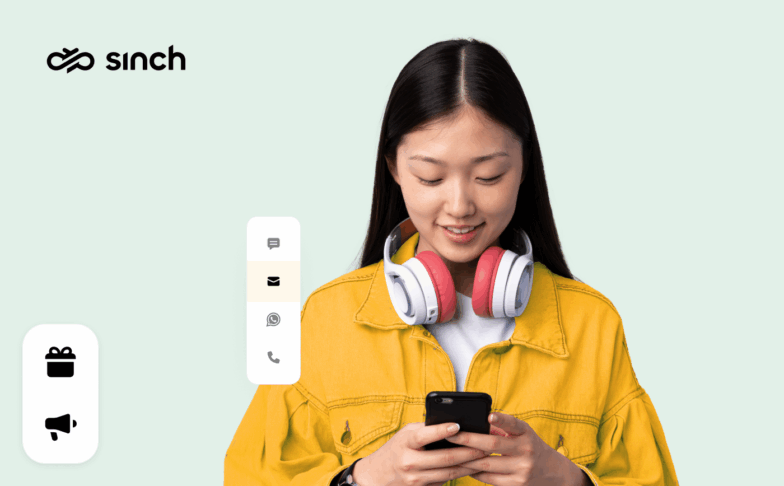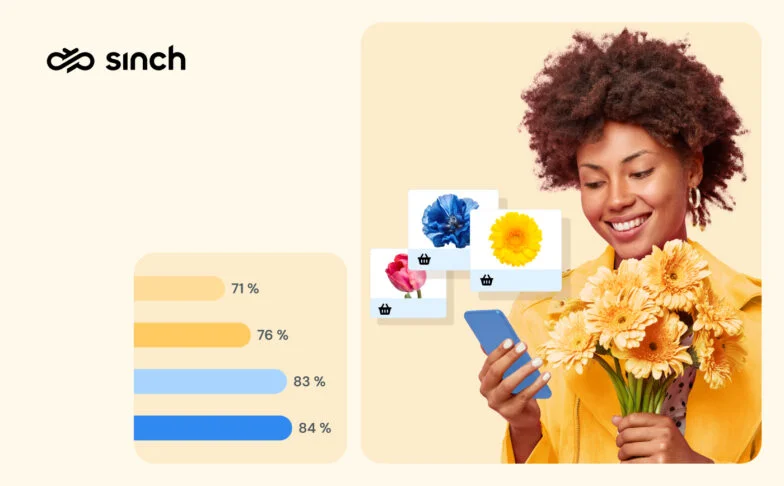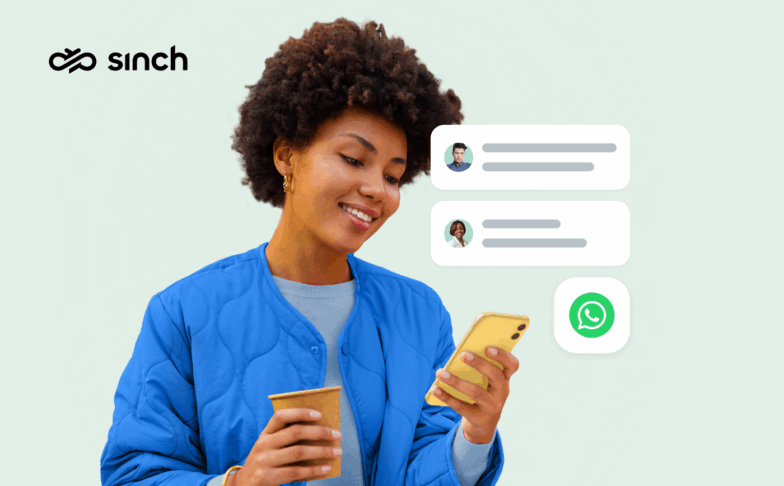Campaigns
Broadcast on Facebook Messenger: 6 examples of successful brands

Meta has recently opened up their recurring notifications feature on Facebook for all businesses. Meaning: The broadcast on Facebook Messenger is back for everyone! How can you use the feature for your business to increase engagement with customers and drive sales? Learn from companies such as BMW, eTicket, and ChicMe… and get inspired!
During their Conversations conference im May 2022, Meta surprised everybody by opening the recurring messages on Facebook back up for all businesses. For the past two years, the feature had been restricted to specific media outlets. Now, every business can send broadcasts on Facebook Messenger again, under the new name of recurring notifications.
In the following, we explain how that works, why it’s more effective than e-mail, share some best practices, and we’ll also take a look at companies, such as BMW or eTicket to show you how other brands are using the feature successfully.
Fast facts: A quick introduction into broadcast on Facebook Messenger
As of May 2022, any type of business that fulfills Meta’s requirements and has a Facebook page can send their customers recurring notifications through the Facebook Messenger. Before, Meta only allowed certain media outlets to use the feature. Now that the feature is back, how does it work?
Setting up broadcast messages on Facebook Messenger
A user has to message the business first.
The first rule for sending recurring notifications on Facebook is: The user has to contact your business first. This could happen through a click-to-chat action, a direct message, a reaction to a message, and a few other ways that Meta has defined.
Companies have to reply in 24 hours
Once a user has contacted your business on Facebook, you have up to 24 hours to reply. Messages that are sent within that time frame are allowed to contain promotional content. For recurring notifications, send the user a request for forwarding them a regular newsletter.
Users have to opt in
After they receive your request, users can choose to receive your notifications at a set frequency, which can be either daily, weekly, or monthly. Users are not limited to a time window, they can opt in at any time.
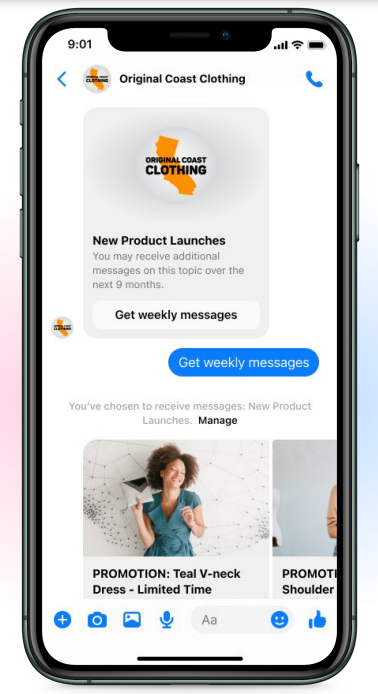
Important: users have to opt in! Otherwise, you are not allowed to send them messages. Users will also be able to block or mute the conversations at any point. Once a user has signed up for your notifications you are free to send news, updates, newsletters, or regular promotions, and start building closer relationships with your customers.
Renew opt-in
After a certain time period, the opt-ins expire, and they have to be renewed. For daily messages this happens after six months, for weekly messages it’s nine months, and for monthly messages the opt-in expires after twelve months. When a person’s opt-in is about to expire, they get an automated request to opt in again, and continue the subscription.
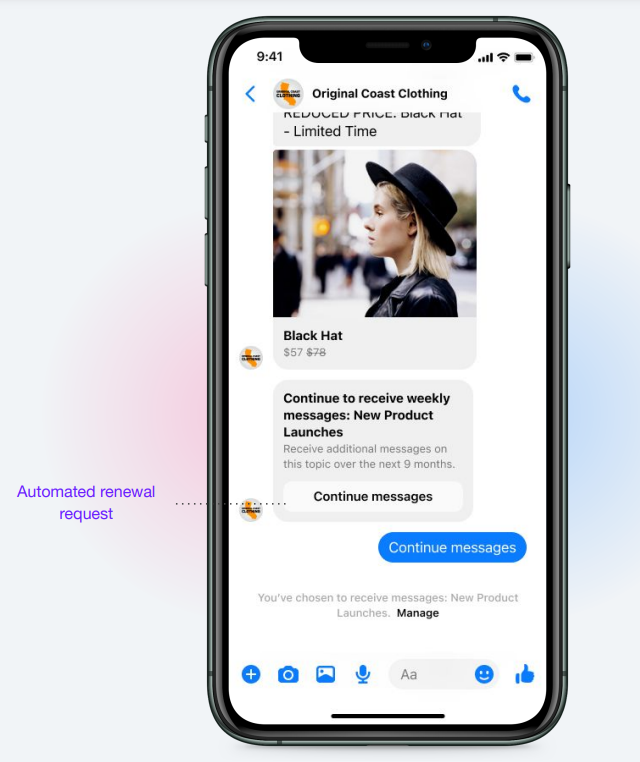
Costs
Recurring notifications are an optional premium feature on Facebook. This means that you don’t have to use it, but it’s available to you. Currently, the feature is in a trial period where companies can test it free of charge. However, at some point in the future, Meta will charge for this feature (although no price has been mentioned yet).
According to Meta, though, companies that have started using the Facebook notifications, are already seeing some great returns.
13 times more revenue per customer: Benefits of broadcasts on Facebook Messenger
Recurring notifications is a Messenger Platform capability that enables businesses to initiate ongoing messages with interested customers anywhere in their journey and on several topics. This allows customers to hear from their favorite businesses in ways that weren’t possible before on Messenger.
Meta
Just like the WhatsApp broadcasts, the recurring notifications on Facebook allow companies to constantly re-engage with their customers. And: because customers explicitly expressed interest in your messages, your chances for a conversion are a lot higher than just sending out a message blindly.
You also get a lot more visibility on a messaging app than you ever would in their e-mail inbox or even by just posting on social media.

By being able to send interested customers a notification at any point of the customer journey, you will also end up creating more meaningful relationships with your customers and create high quality conversions.
At least, that’s what the results of companies that have started using the feature seem to indicate. For example, some companies reported:
- 79% increase in open rate (compared to e-mail).
- 13 times more revenue per customer (compared to e-mail).
- 33% of first-time buyers from notifications made repeat purchases within 60 days.
How did they achieve these results? The following examples show how brands are using the recurring notifications on Facebook very successfully.
BMW: Driving brand awareness
Deciding to buy a new car takes a long time, and it can be tricky for car companies to remain top of mind with potential buyers. That’s why BMW Taiwan decided to use the recurring notifications on Facebook to send out daily content to fans of their Taiwanese Facebook page.
The results:
- ⭐️ 78% opt-in rate to receive notifications
- 🚀 10 times increase in campaign engagement (compared to past campaigns)
With recurring notifications, we cannot emphasize enough that we have a lot more flexibility in our creatives in terms of promotions. We can proactively reach out to customers with personalized content and fully utilize our Messenger channel as a customer care channel and a full-funnel channel with better customer engagement.
BMW Taiwan
eTicket: Boosting engagement
As a ticketing platform, it’s very important for eTicket to keep fans updated on upcoming events. Recurring messages are perfect for that. In order to make sure they were sending the messages to the right customers (it might not be ideal to send a message about a Metallica concert to a Taylor Swift fan), they set up their “send-to-Messenger-” plugin on the artists’ event pages.
That way, eTicket was able to send fans relevant news about their favorite artists. They received daily and monthly reminders for events.
The results:
- ⭐️ 72% opt-in rate to notifications
- 💰 65% of fans who received a notification made a same-day purchase
Recurring notifications have been a game changer for fan engagement. This same-day purchase rate is even more impressive when compared to e-mail campaigns, where it could take a fan up to 72 hours to open their inbox. We’ve seen easier interactions and faster purchases through the
efficiency of recurring notifications.Adrian Contreras, co-founder and CTO, eTicket
Kee Wah Bakery: Driving sales with opt-ins
The Kee Wah Bakery was looking to connect more with their Facebook fans, and decided to start a ten day trial of the notifications feature. They led their fans through ads to their messaging newsletter. Users that saw the ad and clicked on it, ended up in the Messenger from Meta, and could there opt in for recurring notifications.
As an incentive, Kee Wah Bakery added an exclusive coupon for discounts and promotions for new subscribers.
The results:
- ⭐️ 80% opt-in rate to notifications
- 💰 30% coupon redemption rate
Through Recurring Notifications, we’ve developed closer connections with our customers. We’ve always shown great attention to the quality of our customers’ experience, starting with our flavorful pastries. Now, using Recurring Notifications, we’re bringing the same care and focus to the ways our customers receive information from us.
Terry Lau, assistant marketing manager, Kee Wah Bakery
ChicMe: New way to reach customers
E-commerce company ChicMe was looking for new ways to reach their customers, beyond e-mail or SMS. They encouraged shoppers to opt in to their recurring notifications on Facebook to receive daily deals. Once somebody signed up, they could also redeem coupons.
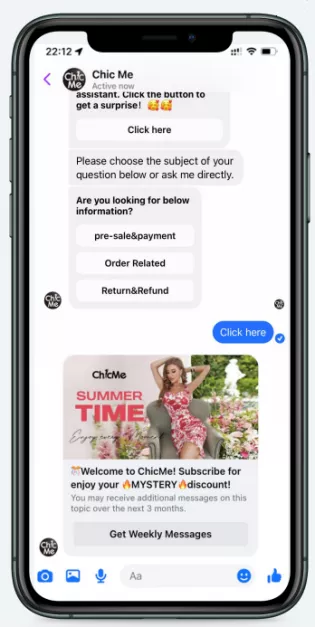
The results:
- ⭐️ 79% increase in open rate compared to e-mail campaigns
- 💰 33% of first-time buyers made repeat purchases
- 🚀 13 times increase in revenue per customer vs. e-mail
Urban List: Increasing readership
Australian media company Urban List Perth stands out by sending out 30,000 recommendations per hour to their audience. Their readers receive tips on local culture, lifestyle, travel suggestions, and much more. In order to re-engage readers with content from their partners, Urban List initiated a Christmas giveaway campaign through a broadcast on Facebook Messenger.
People who opted-in, received daily messages about new campaigns and promotions.
The results:
- ⭐️ 88% click-through rate on notifications
- 🚀 97% read-through rate on notifications
With recurring notifications, we gain a powerful way to deliver personalized bulk messaging through a social media channel that is popular with our readers. Instead of encouraging readers to visit our website, we can use recurring notifications to create ongoing connections and trust with readers.
Claire Logan, Perth editor, Urban List
Outer Aisle: Boosting sales
California-based company Outer Aisle specializes in creating tasty alternatives to flour products. Their products can be found in stores, but also be ordered online, and they also have a delivery subscription. In order to increase the online orders, Outer Aisle created click-to-ads for Facebook that led users to the Messenger where they could opt in for a newsletter. Those who signed up, received a 15% discount on their first order.
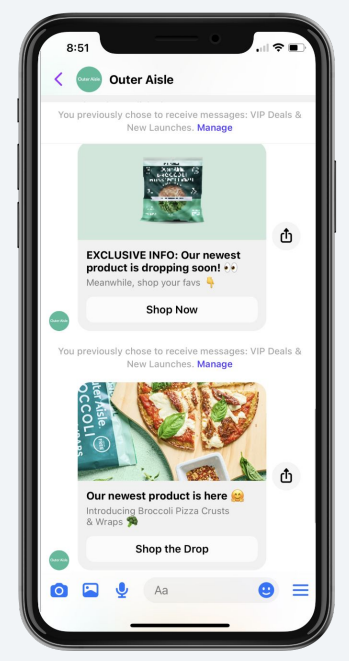
The results:
- ⭐️ 20 times increase in CTR vs. email
- 💰 30% increase in average order value
We were impressed to see how well recurring notifications converted leads for Outer Aisle and how they performed better than any other channel. Recurring notifications are low investment, low risk, and high return.
Raquel Luczo, integrated marketing manager, Outer Aisle
Best practices: How to get the most out of recurring notifications on Facebook Messenger
While sending recurring notifications on Facebook can be an interesting option to engage with your customers, it’s also important to be very mindful about the process in order to get the most out of the feature.
Be clear in your opt-in message
When you ask people to opt in to receive your notifications, be clear about what they’ll receive. Will you be sending them daily flight deals, a monthly event update, or weekly newsletters? Let them know exactly what they can expect. That way, you’ll see a higher opt-in rate and a lower number of unsubscribes.
Incentivize opt-ins
Give your fans a good reason to subscribe to your notifications. Adding discounts, special promotions or coupons will make it more attractive for people to opt in.
Pick the right intervals
Pick the best message frequency for your target audience. For one target group, receiving daily messages might be off-putting, for another that might be exactly what they want. Also: think about the best time for sending notifications to your audience in order to increase the open rate of the messages.
Create relevant messages
The more relevant the messages are to your customers, the better the response will be. Make sure that the messages you send are specific to your target group, and that the content is valuable to them.
Track and optimize
When you are first starting out, it might make more sense to start with one specific use case, and see how that goes, before you expand the usage. That way, you can gather valuable insights first. Make sure to track the performance of your notifications through relevant KPIs to understand if the tool works for you, and how you can optimize it.
Find a good software solution for your company
While using Meta’s cloud API to send recurring messages on Facebook might work for some companies, there are also other options. Especially, if you want to include other messaging apps in your customer communication, such as WhatsApp, Apple Messages for Business or Telegram, or if you are worried about data protection, there are alternatives.
Professional business solution providers like Sinch Engage have developped ready-to-go solutions that don’t require any coding skills to get started and allow you to manage your instant messaging communication through one central inbox.
So instead of spending time and money on IT resources to connect your company to the Meta API, you can get started right away, and scale your business communication faster.

